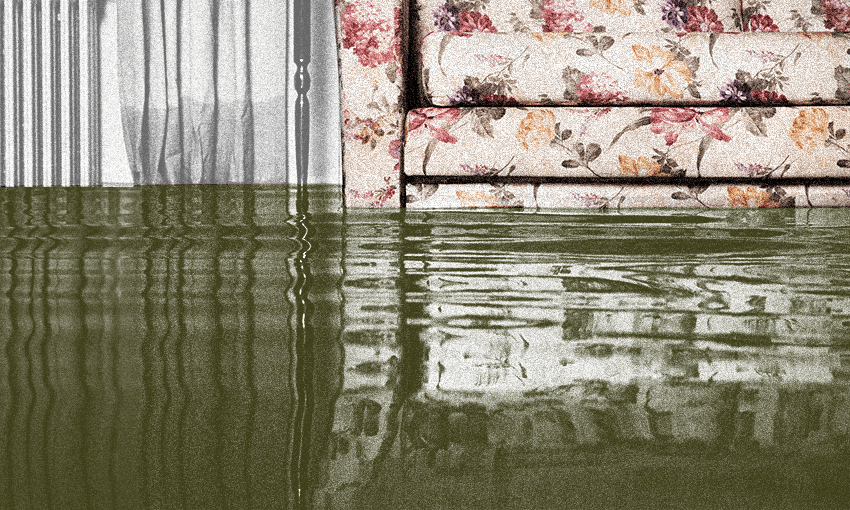It’s been a rough ride since Louisa Opeteia hopped out of bed to find herself standing in a rising tide, but she’s grateful for the little things: a hot meal and the helping hands of friends, family and kind strangers.
Friday morning, January 27. Louisa Opetaia of Māngere noticed the rain trickling down the windows of her three-bedroom rental home as she got ready for work. Not the summer she and many Aucklanders had been hoping for leading into a long weekend – but the city’s residents are no strangers to rain.
Opetaia grabbed an umbrella and headed to the bus stop, starting her daily commute into the CBD.
She clocked off around 4.30pm and emerged from work to be greeted by the rain again. As she stared out of the window of the bus taking her home, she thought about the relaxing evening she had planned. “I was looking forward to some Netflix and my favourite snacks,” she says.
And that’s what she did, but she was too tired to stay awake and enjoy it. A few minutes into her Netflix show, Opetaia fell asleep. It was 7.30pm.
Opetaia woke an hour later to use the toilet. It was dark. She swung her legs to the side of the bed to get up, placed her feet on the floor and found herself standing in water. “I still remember hearing the splash when I first touched the cold water,” she says. “I immediately thought, did I flood the house? Did I leave the water running?”
The water initially came up to her calves; it wasn’t long until it reached her knees.
Her daughter’s room was also completely flooded, although luckily she wasn’t home. Opetaia waded through the water to her office to find the flooding had reached there too.
Still reeling, Opetaia made her way to a window where she saw her driveway was underwater. That’s when she realised the flooding hadn’t only affected her home.
Opetaia’s sister’s family lives in the house behind hers and so she quickly went over to see if they were flooded too. The power was out there, but other than that they were OK. “Thankfully my sister’s house is higher up and so there was minimal damage to her place.”
Opetaia went home to retrieve her laptop and her family’s birth certificates and passports before taking refuge at her sister’s home.
But she couldn’t sleep. “It kept raining and I was scared that the water level would get higher and reach my sister’s place,” Opetaia says.
Opetaia spent that sleepless night trying to comprehend what was happening, and at a loss over what to do next. “I’ve lived in earthquake-prone cities such as Tokyo and Honolulu and I know what to do when there’s an emergency, but I was not prepared for a flood,” she says.
The next day Opetaia stayed with her sister, avoiding embarking on a clean-up in fear of the possibility it would rain again.
On Sunday she learned that an evacuation centre had opened in Māngere and she made her way there to see what help was available. “I spoke with representatives from the Ministry of Social Development (MSD) and they advised me that I’m eligible for a benefit due to being affected by the flooding, despite working full time,” she says.
The Civil Defence payments are available for people affected by the flooding. MSD has advised that in most cases, income levels and assets don’t affect eligibility. While the payment will be largely directed at Aucklanders, non-Auckland residents may also be eligible for the payment.
Help at the evacuation centre included an electrician to answer questions on home power supply, emergency management representatives, and many others offering food boxes and essential household items.
Opetaia’s one request was to have a skip bin brought to her house. When it finally arrived, she and her family filled it up, not just with damaged furniture, but with everything else – sentimental and practical – that a busy household contains.
Workers turned up to pull up Opetaia’s saturated carpet. “It smelt like a wet dog,” she says. Electricians arrived to disconnect the wiring. “When our power was restored 24 hours after the flooding, I still chose not to use any appliances as I was worried about getting an electric shock or starting an electrical fire.”
Opetaia initially moved from her sister’s home to a campervan lent to her by a workmate. In the campervan she could sleep, catch up on admin and make essential trips, including to the local laundromat, where she did about six loads of washing for three nights in a row. She is now in emergency accommodation.
“I’m so appreciative of my family and friends who have organised Uber Eats for the many nights I didn’t have access to a kitchen. I can’t stress enough how a hot meal is incredibly helpful for people affected by the floods,” she says.
“This experience has been mentally challenging and taxing, but I don’t entertain the thought of ‘why me?’ and just look at the positive outlook of the whole event and move forward.”
What can the Civil Defence Payment cover?
- Emergency food, clothing and bedding if your items were damaged or destroyed by the flooding.
- Costs if you have to leave your home.
- Loss of income because you can’t work due to the flooding.
- A payment if you have evacuees staying with you in a private home, marae or community centre.
How to apply for the Civil Defence payment
Call 0800 400 100 or see MSD staff at the one of the Civil Defence Centres (Moana-Nui-A-Kiwa) listed here. There’s no appointment needed – depending on location, some are open 8am to 5pm, while Māngere is open 24 hours.
For further advice for those in need after the floods, see The Spinoff’s list of where to get help.
